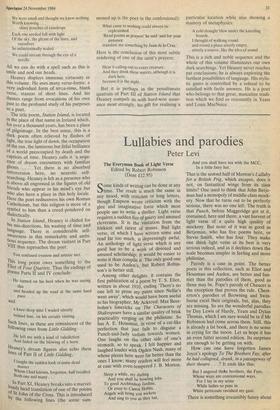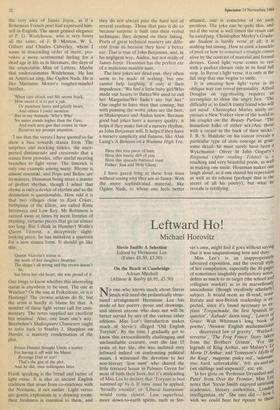Lullabies and parodies
Peter Levi
The Everyman Book of Light Verse Edited by Robert Robinson (Dent £12.95)
Some kinds of writing can be done at any time. The result is much the same in any mood, with criticism or long letters, though Empson wrote criticism with the glee and imaginative force which most people use to write a thriller. Light verse requires a sudden fizz of gaiety and amused cleverness. It is the visitation from the friskiest and rarest of muses. Bad light verse, of which I have written some and read far too much, is depressingly awful. An anthology of light verse which is any good has to be a work of devoted and amused scholarship; it would be easier to write it than compile it. The only good one used to be Auden's, but Robert Robin- son's is better still.
Among other delights, it contains the first publication of a poem by T. S. Eliot, written in about 1910, ending 'There's no one left to press my pants since Nellie's went away', which would have been useful to his biographer, Mr Ackroyd. Max Beer- bohm's limericks on The Characters of Shakespeare have a similar quality of brisk practicality verging on the philistine. So has A. E. Housman, in verse of a cat-like perfection that just fails to disguise a Punch-and-Judy sadism towards women. One laughs on the other side of one's stomach, so to speak. I felt happier and laughed louder with Ogden Nash, many of whose pieces here were far better than the ones I know; many readers will feel more at ease with even-tempered J. B. Morton.
Sleep a while, my darling
And you shall be bowling lobs To good Archbishop Jardine,
Or even to Canon Hobbs. Angels will bring you wickets And sing to you as they bat, And you shall have tea with the MCC, In a little fairy hat.
That is the second half of Morton's Lullaby for a British Prig, which escapes, does it not, on fantastical wings from its class limits? One used to think that John Betje- man had a monopoly of middle-class mock- ery. Now that he turns out to be perfectly serious, there was no one left. The truth is that Punch, before Muggeridge got at it, contained, here and there, a vast harvest of light verse of a quite high quality of mockery. But none of it was as good as Betjeman, who has five poems here, or Stevie Smith, who has four. They make one think light verse at its best is very serious indeed, and as it declines down the scale becomes simpler in feeling and more philistine.
Parody is a case in point. The better poets in this collection, such as Eliot and Housman and Auden, are better and fun- nier than the parodies of them, good as those may be. Pope's parody of Chaucer is the exception that proves the rule. Chest- erton's parodies of Browning and Swiss- burne excel their originals, but, alas, they are missing. So are the wonderful parodies by Day Lewis of Hardy, Yeats and Dylan Thomas, which I am sure would be in if Mr Robinson had come across them. Still, this is already a fat book, and there is no sense in crying for the moon. Let us hope it has an even fatter second edition. Its surprises are enough to be getting on with.
How can one have forgotten James Joyce's apology To The Brothers Fay, after he had collapsed, drunk, in a passageway of their theatre . . .? It ends like this:
But I angered thoke brothers, the Fays, Whose ways are conventional ways, For I lay in my urine While ladies so pure in White petticoats ravished my gaze.
There is something irresistibly funny about the very idea of James Joyce, as if a Bohemian French poet had expressed him- self in English. The more genteel elegance of P. G. Wodehouse, who is very funny all the same, of J. B. Morton, W. S. Gilbert and Charles Calverley, whom I name in descending order of merit, pro- vokes a more sentimental feeling for a dead age in life as in literature, the days of the respectable Man of Letters. Maybe that underestimates Wodehouse. He has an American zing, like Ogden Nash. He is like Marianne Moore's tougher-minded brother.
When cars attack and life seems black, How sweet it is to pot a yak, Or puncture hares and grizzly bears, And others I could mention: But in my Animals 'Who's Who' No name stands higher than the Gnu: And each new gnu that comes in view Receives my prompt attention.
I see that the verses I have quoted so far show a bias towards stanza form. The surprises and mocking tinkles, the unex- pected diminuendo and crescendo that a stanza form provides, offer useful meeting branches to light verse. The limerick is only one example among many. Rhyme is almost essentittl, and Pope and Belloc are its masters, Housman being more a master of perfect rhythm, though I admit that rhyme is only a device of rhythm and so the distinction is questionable. How odd it is that two villages close to East Coker, birthplace of the Eliots, are called Rime Intrinseca and Low Key. Mr Robinson is carried away at times by mere frenzies of rhyming, virtuoso pieces that go on almost too long. But I think in Humbert Wolfe's Queen Victoria, a deceptively slight- looking piece, he has mistaken a quatrain for a new stanza form. It should go like this:
Queen Victoria's statue is the work of her daughter Beatrice.
The shape's all wrong and the crown doesn't fit, but bless her old heart, she was proud of it.
One longs to know whether this interesting statue is anywhere to be seen. The one at Windsor? Or the one at Folkestone, or is it Hastings? The crowns seldom do fit, but the artist is hardly to blame for that. A number of these light verses call for com- mentary. The notes supplied are excellent but minimal. Also, one loses one's way. Beerbohm's Shakespeare Characters ought to refer back to Stanley J. Sharpless on Hamlet, a masterly condensation of the plot.
Prince Hamlet thought Uncle a traitor For having it off with his Mater: Revenge Dad or not?
That's the gist of the plot.
And he did, nine soliloquies later.
Frank speaking is the bread and butter of light verse. It is also an ancient English tradition that arose from co-existence with the Normans, if not earlier. Light verses are gentle explosions in a drawing room: their freshness is essential to them, and they do not always pass the hard test of several readings. Those that pass it do so because surprise is built into their verbal technique; they depend on their timing. Poets of great technical mastery are diffe- rent from us because they have a better ear. That is true of John Betjeman, and, in his negligent way. Auden, but not really of James Joyce. Housman has the perfect ear of a malicious maiden aunt.
The best jokes are dead-pan, they often seem to be made of nothing, but one cannot help laughing, if only at their, impudence. 'We had a little baby girl/Who made our hearts to flutter/We used to call her Margarine/We hadn't any but her.' One ought to have seen that coming, but with punning the worst jokes are the best, as Shakespeare and Auden knew. Because good bad jokes have a nursery quality, it helps if they make fun of a nursery rhythm, as John Betjeman will. It helps if they have a nursery simplicity and flatness, like Alan Laing's A Benison on a Wartime High Tea.
Bless this tiny piece of ham Bless this lonely dab of jam Bless this sparsely-buttered toast Father, Son and Holy Ghost.
I have gazed long at these four lines without seeing why they are so funny. With the more sophisticated material, like Ogden Nash, to whom one feels better
attuned, one is conscious of no such problem. The joke can be quite thin, and yet if the verse is well timed the result can be satisfying. Christopher Morley's Gradu- ate Student is hardly verse at all; it is nothing but timing. How to cook a knuckle of pork or how to construct a triangle comes alive by the contrast of material and formal devices. Good light verse comes to rest with a perfect closure only in its final full stop. In Byron's light verse, it is only at the full stop that one begins to smile. It is amazing how light verse in its oblique way can reveal personality. Alfred Douglas on egg-stealing requires an accomplice to draw the angry hen. The difficulty is, to find/A trusty friend who will not mind'. Christopher Morley nicely ex- presses a New Yorker view of the world in his couplet on the Beauty Parlour. 'The homeliest folks of either sex,/Are those with a crease in the back of their necks.' J. B. S. Haldane on his cancer reveals a particular type of stoic courage in grue- some detail: he must surely have been a Wykehamist. Oliver St John Gogarty's Ringsend (After reading Tolstoi) is a touching and very beautiful poem, as well as making one smile. Housman makes one laugh aloud, as if one shared his repression as well as its release (perhaps that is the secret of all his poetry), but what he reveals is terrifying.























































 Previous page
Previous page